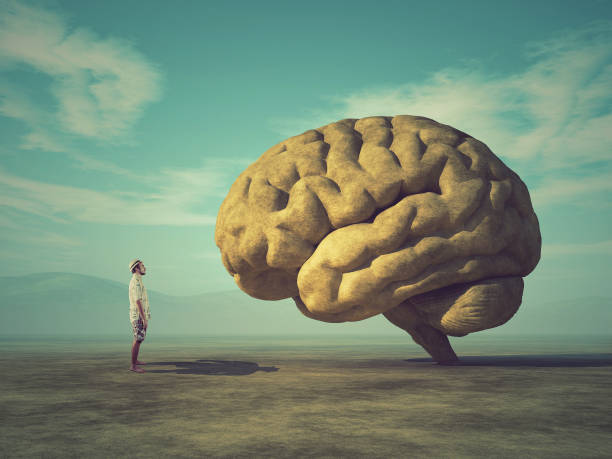# Introduction

[image source](https://www.istockphoto.com/photo/the-young-and-conceptual-image-of-a-large-stone-in-the-shape-of-the-human-brain-gm924291506-253667854?phrase=mood%20and%20IQ)
[Depression](https://www.nimh.nih.gov/health/topics/depression) is a serious mental illness that can affect anyone, regardless of age, race, or intelligence. Unfortunately, depression often goes undiagnosed and untreated, which can lead to a decline in intelligence.
Depression can have a number of negative effects on the brain, including reduced [neurogenesis](https://qbi.uq.edu.au/brain-basics/brain-physiology/what-neurogenesis#:~:text=Neurogenesis%20is%20the%20process%20by,birth%20and%20throughout%20our%20lifespan.) (the growth of new neurons), reduced synaptic [plasticity](https://www.frontiersin.org/articles/10.3389/fpsyg.2017.01657/full#:~:text=Neuroplasticity%20can%20be%20viewed%20as,and%20in%20response%20to%20experience.) (the ability of neurons to form new connections), and reduced cognitive function. This can lead to a decline in intelligence and problem-solving skills.
People with depression are also more likely to engage in self-destructive behaviours, such as drug and alcohol abuse. This can further impair cognitive function and lead to an overall decline in intelligence.
If you are concerned that you or someone you know may be suffering from depression, please seek medical help. Depression is a very real and serious illness, but it can be treated and managed with the help of a professional.
## What Is Depression?
[**Depression is one of those silent killers** ](https://hive.blog/hive-148441/@yblinksy/depression-the-silent-killer)
Depression is a mental illness that affects your mood, thoughts, and behaviour. It can lead to a loss of interest in activities you once enjoyed, feelings of sadness and emptiness, and a lack of energy.
**Depression can also affect your intelligence**. Studies have shown that people with depression tend to score lower on intelligence tests than those who do not suffer from the illness. This is likely due to the fact that depression can interfere with your ability to concentrate and focus.
If you are experiencing symptoms of depression, it is important you seek help from a qualified professional.
## What Are the Symptoms of Depression?

[image source](https://www.istockphoto.com/photo/woman-depressed-and-alone-gm680693460-124752213?phrase=depression%20)
Depression is a serious mental health condition that can affect your intelligence.
There are many different symptoms of depression, but some of the most common are feeling sad or hopeless, losing interest in activities you once enjoyed, feeling tired all the time, and experiencing changes in your appetite or weight.
If you are experiencing any of these symptoms, it is important to see a doctor and get help. Depression can be treated, and early intervention is key to preventing long-term damage to your mental health.
**A story on depression**- [**check here**](https://hive.blog/hive-175254/@matthiasolusegun/phycology-or-or-depression-or-or-my-personal-experience#@josevas217/re-samminator-qa0f99)
#### How Does Depression Affect Intelligence?
Your mood can affect your intelligence.
When you're feeling down, you may find it harder to concentrate and focus on tasks. You may also have trouble making decisions and solving problems. This can lead to a decrease in your IQ score.
Depression can also have a negative impact on your memory. You may have difficulty recalling information or remembering past events. This can also affect your IQ score.
Fortunately, treatment for depression can help improve your mood and increase your intelligence levels.
#### Does Depression Affect All Areas of Intelligence Equally?
According to the study, depression seems to affect different areas of intelligence equally. There was no significant difference in performance between the depressed and nondepressed groups in any of the tests measuring general intelligence, verbal intelligence, or performance intelligence.
However, there was a significant difference in memory recall. The depressed group performed significantly worse than the non-depressed group on tests of visual and verbal memory recall.
##### [How Can You Treat Depression](https://emedicine.medscape.com/article/286759-treatment) ?
While there is no one-size-fits-all answer to this question, there are a few treatments that have been shown to be effective in treating depression. Some people may benefit from medication, while others may prefer therapy or self-help treatments.
No matter what treatment you choose, it is important to stick with it and be patient. Depression can take time to overcome, but with the right help, you can get on the road to recovery.
###### Are There Any Risks Associated With Treating Depression?
It is important to note that there are some risks associated with treating depression. For example, antidepressant medications can sometimes have adverse side effects. Some people may also experience a reduction in their intelligence if they are treated for depression.
However, these risks should not deter you from seeking treatment if you are suffering from depression. The benefits of treatment usually outweigh the risks, and most people who receive treatment are able to improve their quality of life.
# Conclusion
***Depression can have a profound and significant effect on intelligence. The good news is that with the right diagnosis and treatment, many people with depression see an improvement in their IQ scores.***
***If you're concerned that you or someone you love may be suffering from depression, don't hesitate to reach out for help. There are many resources available, both online and in person, and with the right treatment and support, you can start to feel like yourself again.***
**Remember you are not dumb, you might just be depressed and demotivated.**
# Thanks for reading, Sayonara 🖐
##### References/Resources
[Ref 1](https://www.nimh.nih.gov/health/topics/depression)
[Ref 2](https://www.physio-pedia.com/Neuroplasticity)
[Ref 3](https://www.google.com/search?q=neurogenesis&rlz=1C1JJTC_enNG985NG985&biw=1366&bih=695&sxsrf=ALiCzsaYJSaWfaedW0vpj0xXw384_WZqsw%3A1666131229442&ei=HSVPY83IGoi7sAfRhbbYAw&oq=neurogensi&gs_lcp=Cgdnd3Mtd2l6EAEYADIHCAAQgAQQCjIHCAAQgAQQCjIHCAAQgAQQCjIHCAAQgAQQCjIHCAAQgAQQCjIHCAAQgAQQCjIHCAAQgAQQCjIHCAAQgAQQCjIHCAAQgAQQCjIHCAAQgAQQCjoKCAAQRxDWBBCwAzoECCMQJzoHCCMQ6gIQJzoFCAAQkQI6DgguEIAEELEDEMcBENEDOggIABCABBCxAzoOCC4QgAQQsQMQgwEQ1AI6BQgAEIAEOgUILhCABDoLCAAQgAQQsQMQgwE6CgguEMcBENEDECc6BAgAEEM6CggAELEDEIMBEEM6BwguENQCEEM6CwgAELEDEIMBEJECOgoILhDHARDRAxBDOg4IABCABBCxAxCDARDJAzoNCAAQsQMQgwEQyQMQQzoHCAAQsQMQQzoLCC4QgAQQxwEQrwFKBAhBGABKBAhGGABQqQhYzitghzloAnABeASAAZUDiAGZJJIBBzItNi44LjGYAQCgAQGwAQrIAQjAAQE&sclient=gws-wiz)
[Ref 4](https://hive.blog/hive-148441/@yblinksy/depression-the-silent-killer)
[Ref 5](https://hive.blog/hive-175254/@matthiasolusegun/phycology-or-or-depression-or-or-my-personal-experience#@josevas217/re-samminator-qa0f99)
 hiveblocks
hiveblocks